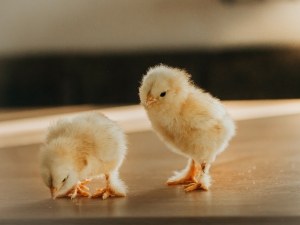
A sudden change in how your chick behaves, especially a change as violent as the bird-flipping on its back and shaking, will be concerning to any chick raiser.
This article looks into why your chick may be flipping on its back and shaking.
Table of Contents
Chick keeps flipping on back and shaking:
Unfortunately, chicks are very fragile, so a variety of ailments and illnesses can kill your bird and so can a variety of injuries.
For this reason, it is recommended that you take action when you see your bird acting out of the ordinary.
A chick flipping on its back is out of the ordinary. Here is why this may be happening with your bird:
Vitamin E deficiency:
A vitamin deficiency, a lack of vitamin E in particular, can cause your bird to fall back and shake.
This essential vitamin helps with the bird’s muscles, circulatory system, fertility, egg production, and immune response. A lack of vitamin E can bring about a whole host of issues in your chick.
A lack of vitamin E can cause your bird to lose balance, fall over, and also have convulsions and tremors.
Other signs of a vitamin E deficiency in your bird’s diet include enlarged hocks, weakness, decreased laying, muscle spasms, paralysis, poor growth, decreased fertility, the inability to walk, and muscle dysfunction to name a few.
What to do:
Treating a vitamin E deficiency in your bird is easy and simple and you can do it at home.
The treatments that you can use on your bird include giving the bird vitamin E supplements, either liquid or tablet supplements, or giving your bird foods that are rich in vitamin E.
You can supply the vitamin E through a multivitamin supplement. Your bird will also receive any other nutrients that it may be lacking if you serve the vitamin E in this way.
You can alternatively give your chick more vitamin E rich foods, foods like nettle, sunflower seeds, pumpkin seeds, spinach, chard, and dandelion.
You may also have to keep your baby chick isolated while it recovers to keep it from being trampled by any other birds while it’s flipped on its back.
It is also advised that you take your bird to the vet for an examination and for treatment, especially if the bird isn’t responding ‘to the added vitamin E in its diet.
If you enjoyed this article then you may also be interested in other bird related articles. Here are some articles that you may be interested in: Chick Keeps Flipping On Back, Will A Single Chick Survive?, How To Make A Baby Chick Not Feel Lonely, Why Is One Chicken Always Alone, Why Is My Duck Laying On Its Side?, How To Get A Wild Duck To Trust You, Why Do Ducks Splash In The Water, Why Is My Female Duck Squeaking, Male Duck Making High-Pitched Noise

